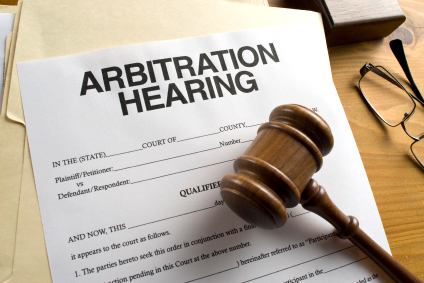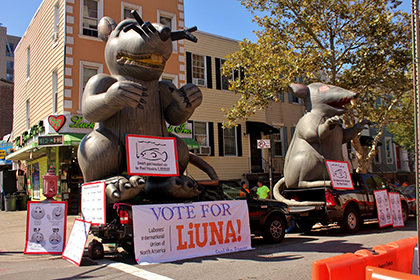
Services

Arbitrations are a condensed form of litigation. Employers faced with an arbitration need experienced counsel who can evaluate the strengths and weaknesses, grasp the appropriate substantive and procedural aspects of the case, develop witness testimony, present the case, and advocate the employer’s position. Stewart law has years of experience with arbitrations beginning with selecting an arbitrator to closing arguments at the proceeding. It also evaluates whether a post-hearing brief would increase the likelihood of success. Pat’s experience includes arbitrations with issues such as just cause discharge and discipline, timeliness, management’s rights, drug testing, contract interpretation, etc.
Collective Bargaining:
Pat Stewart is an experienced negotiator on numerous renewal contracts as well as first agreements and effects bargaining in various industries with major unions. He has obtained successful results in effects bargaining in operational closures and reorganization alignments and negotiated favorable renewal contracts with benefit reductions and moderate union concessions. He has also been responsible for preparing and coordinating strike contingency plans with labor stoppage security and worker replacement firms.


Discrimination Claims/Litigation
Stewart Law regularly provides legal guidance to companies on investigating and responding to equal employment opportunity charges and other complaints filed internally or externally with federal, state and local agencies, including the preparation and oversight of position statements as well as counsel in mediation proceedings. He has extensive experience in the alternative dispute resolution (ADR) processes utilized by federal and state fair employment agencies in Maryland and the District of Columbia. In addition, Stewart Law has obtained favorable results in negotiating numerous quick “nuisance value” settlements when requested by the employer.
Stewart Law also has a great deal of experience in litigating discrimination claims in the state and federal courts in Maryland and the District of Columbia. Pat Stewart has dealt with all types of discrimination claims in those forums, including discrimination based on race, age, sex, disability, national origin, and retaliation.
Employment-Related Litigation:
Stewart Law counsels employers on the investigation and litigation of employment-related claims such as discrimination, wrongful discharge, wage and hour law violations, non-competition/restrictive covenant enforcement, employee theft and embezzlement in federal and state courts.


General Labor and Employment Law
Routinely provides advice in drafting and reviewing employee handbooks and policies for compliance with state and federal law. Provides advice on all personnel matters such as discipline and discharge, wage and hour law compliance, drug testing requirements, compliance with ADA, FMLA, SCA, DBA, etc.
Non-Competition Agreements
As a rule, post-employment of restrictive covenants such as non-compete and non-solicitation of customers and employees are enforceable by the courts provided certain conditions are met, the most important of which is that the terms are reasonably necessary to protect the employer’s interest. Stewart Law assists employers in the preparation of employment agreements to ensure that such covenants will be enforceable, and also litigates breaches by employees. It also represents management level employees who are sued for such violations.


Prevailing Wage Laws
Federal, state and local government procurement projects typically require adherence to corresponding prevailing wage laws. For example, in the construction industry, the federal Davis-Bacon Act and state “mini-Davis Bacon Acts” require compliance with local wage determinations which govern minimum rates of pay, overtime pay, and hourly fringe benefits. The same holds true with government contracts in the service industry. Stewart Law offers its clients experience in matters arising under these laws which often spring from employee or union claims of non-compliance. It has also successfully obtained conformances for clients who seek to add specific categories of positions that are not identified in the wage determinations. Based on his experiences, Pat knows where to go and who to talk to at the various agencies to resolve disputes pursued by over-zealous ground floor government investigators.
Training and Development:
Stewart Law develops and delivers training programs on all topics pertaining to labor and employment law for all levels of employees, including legislative and regulatory developments, discrimination and harassment, best employment practices, interviewing techniques, personal liability, and policy interpretation.


Unemployment Claims and Hearings
Many employers fail to recognize the advantages of disputing unemployment claims. Most significant is the fact that testimony provided in the proceedings are recorded and under oath, thus providing the employer and opportunity to cross-examine the former employee which oftentimes provides a valuable record which may be used in a subsequent proceeding, such as a discrimination lawsuit. In addition, the employer needs to consider which person is the best to represent it in the proceeding as that person’s testimony likewise his recorded under oath. Stewart law has years of experience in orchestrating the best approach for employers to take in such cases.
Union Organizing Campaigns/Representation Petitions
Most employers frequently are blindsided when they receive union representation petitions because unions usually gather employee signatures in support of such petitions without the employer’s knowledge. Under the recent rule changes to the processing of petitions by the National Labor Relations Board, employers who receive petitions (which are usually faxed or emailed to the company) have very little time to react. And they lose the ability to raise defenses to the petition if they fail to file the proper responsive papers in a timely fashion. Pat Stewart has acted as counsel in numerous union organizing campaigns/representation petitions throughout the country in a variety of industries. He has had success in defeating representation petitions and organizing campaigns with bargaining units ranging between 15 to 900 plus employees with all major unions. He also has extensive experience in labor relations audits and union avoidance techniques and training.


Unfair Labor Practice Charges
Stewart Law regularly represents companies in defense of proceedings investigated by the NLRB such as refusal to hire (including salting), refusal to bargain in good faith, discipline and termination, and other protected activities. Pat has handled matters which include convincing the NLRB regional offices throughout the country to dismiss unfair labor practice charges in numerous instances, simultaneously developing an excellent professional rapport with various regional office investigators. He has also negotiated favorable settlements in cases where formal complaints issued.
Wage and Hour Law
Many businesses usually have at least one position that is not compensated properly under state or federal law. Employers usually find out the hard way after the employee leaves (or gets fired) and visits a lawyer. A typical example is paying someone on a salary basis when he/she does not qualify as such by federal or state regulations. And the stakes can be high. A successful plaintiff can be awarded liquidated (double) or punitive (triple) damages and the cost of his/her legal fees at the employer’s expense. Stewart Law minimizes potential exposure to such claims by offering wage-hour audits. If a lawsuit is filed, it represents employers. Warning: wage-hour lawsuits have proliferated in recent years with contingency based law firms taking on cases without charge to its clients with the understanding that they will be paid their fees if they prevail in the case.


Wrongful Discharge
The term “wrongful discharge” is universally misconstrued by non-lawyers. Many people, especially employees, believe it stands for the proposition that it is unlawful to terminate someone “unfairly”. However, in most states, including the District of Columbia and Maryland, employment is “at-will” meaning either the employer or the employee may sever their relationship at any time for any reason without incurring liability, provided it does not violate a law (such as discrimination based on a protected attribute) or breach a contract (such as an employment agreement). However, the courts have carved out a narrow exception to the at-will doctrine and have recognized that a civil claim arises when an employee’s termination is based on a public policy such as reporting employer fraud. Stewart Law offers two fronts to minimize such claims. It provides advice to clients either in person or over the telephone before an employee is terminated and defends employers who are sued for such claims in court.
